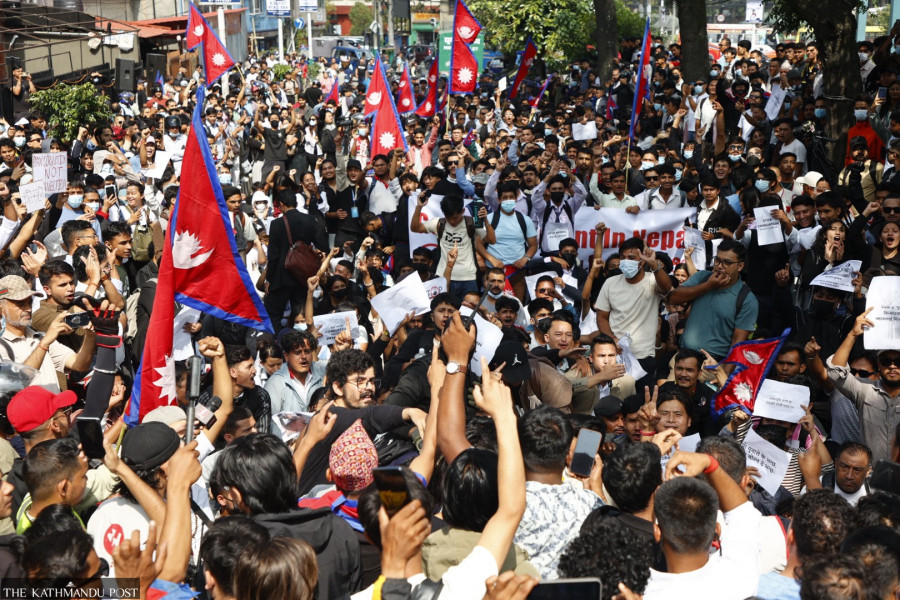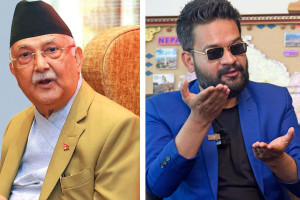Columns
We all are Gen Z
To limit their achievement to being the voice of one generational cohort is to do injustice to the movement.
Deepak Thapa
Until last Monday, the day the Gen Z protests began, I was quite unaware of ‘Nepo Baby’ and ‘Nepo Kids’ as a social media phenomenon in Nepal. I had certainly seen references to the terms in the course of keeping up with the planned demonstrations by the young ones. But that these had riled passions to such an extent was something many oldies like me may have missed. Which says a lot about how out of touch most of us from the earlier generations, including our politician-rulers, are with what is happening in the digital sphere.
Demographic cohorts such as Baby Boomers and the Gen X, the older groupings of the West so called for having been shaped by historical events in their part of the world, had hardly anything in common with us in Nepal besides being contemporaries. In fact, until the end of the last century, there was hardly any similarity of experiences within the same generations throughout Nepal either. That no longer holds true given how connected age groups like Gen Z (and more so the still very young Gen Alpha) are with other Nepalis within the country and without—and beyond.
Perhaps even more crucial is how the younger generation keep themselves informed—as well as misinformed and disinformed—through social media. It is in failing to understand this new reality where perceptions are influenced by powerful and easy-to-digest visuals that the government and those at its helm appear to have miscalculated. They seem to have thoroughly underestimated the degree to which resentment had built up against those in power through their inaction over blatant instances of corruption time and time again and casual misgovernance.
Bad taste
Even as information became easier to access and the younger citizens more aware about what was going on, they continued to be treated like imbeciles or, at best, ignoramuses. Take the following two examples. In a clip going around, Pushpa Kamal Dahal Prachanda labours under the delusion that any criticism of his proletarian daughter (for sporting terribly expensive handbags that are obviously far beyond her means) is actually criticism directed at him. He goes so far as to declare that since he embodies all the changes since 2006, speaking ill of his daughter amounts to an attack on the current political system itself. Convoluted as that logic may sound, that is what the man said.
Likewise, another widely circulated clip features Sher Bahadur Deuba from some years ago berating almost angrily a young man who had the temerity to tell him that he does not represent the aspirations of the youth and basically that his time is up. KP Sharma Oli’s pronouncements are legion and to hear him drone day in day out spewing all sorts of nonsense is enough to put off anyone but his seemingly deaf acolytes. That is what Gen Z along with the rest of us have had to contend with for two decades.
Also consider the larger socio-economic context. Planeloads of Nepalis leave every day to eke out a better life for themselves and their families often under the harshest of conditions. Some of them knowingly have even thrown themselves into active conflict zones, from Iraq and Afghanistan to now Russia and Ukraine, while there are those who spend months traversing the most dangerous parts of the world trying to gain a toehold into a Western country. Those still in Nepal mostly keep busy mulling over ways to exit—in many cases, for good.
What everyone has in common is a smart device which brings them together as a community where they share everything. Simple jokes and songs to real-life happenings and outrage over corruption scandals, and, of course, lavish lives as well. What the many influencers showing off fancy homes, modelling designer clothes or enjoying expensive holidays abroad appear to have forgotten is that they are from a country where the majority of the people are still quite poor despite visible trappings of the middle class.
This is being said with the benefit of hindsight, but the ostentatious displays of affluence was in bad taste and lacked any hint of self-awareness. They ignored that fact that there are very, very few among their compatriots who can even dream of such extravagant lifestyles. In a place where laws are bent all the time by politicians and businesspeople in cahoots with each other, it becomes easy for people to assume the worst of even those whose hands are squeaky clean. That is especially true for a generation who receive their news from rather unconventional sources.
Generation gap
Among the thousands and thousands of videos we all watched these last couple of weeks, there is one of Arzu Rana Deuba talking about seeing well-dressed young people in Putali Sadak strutting about with their mobile phones. Probably because people found her remarks patronising or even condescending, viewers’ comments were quite brutal.
Truth be told though, similar views have been expressed by many of us who came of age in the 1960s, 1970s and 1980s. We would have remarked on the fact that patched clothes are a thing of the past in Nepal and that no one goes around barefoot. Growing up at a time when even owning a bicycle was a big deal and the only motorable roads outside urban areas were the few highways linking Kathmandu and Pokhara and both with the Tarai, along with the one that had begun to run its length, we have marvelled at how far Nepal has changed in all sorts of ways.
Of course, we would also moan about how we have been held back by incompetence and corruption in high places. But having conditioned ourselves to accept change as something that evolves slowly, we were not able to see that the younger generation had very different ideas. The youth everywhere have always been in a hurry but the youth this time are different. They are very well aware about the world outside Nepal and what they have been missing out on. And having lived their entire lives under a system that has been in constant flux but has ultimately resulted in the same old and discredited men rotating back to power, they called for change and made it possible.
The Gen Z protests were about a complete transformation in how the state functions. Their demands were not only theirs but of the entire country, even of Generation Beta, just being born. To limit what they have achieved to being the voice just one generational cohort is to do injustice to their movement. In that sense, we are all Gen Z.




 16.12°C Kathmandu
16.12°C Kathmandu















